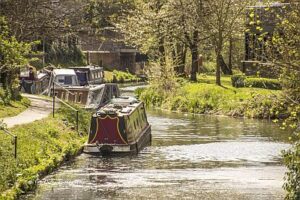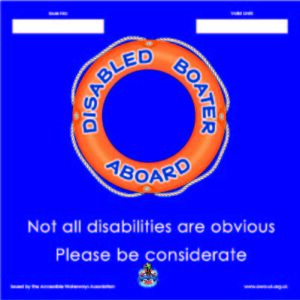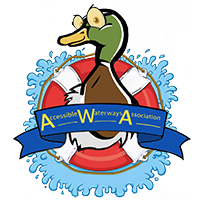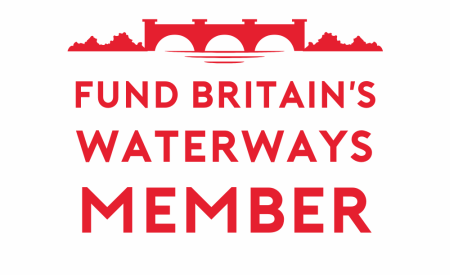 Making the waterways more accessible for all
Making the waterways more accessible for all
Fully independent of all waterways authorities, the Accessible Waterways Association (AWA) has been set up to inform, represent, and assist people who live with disabilities, impairments, or any other accessibility issues, and who want to enjoy the Inland Waterways and their surrounding environments in the same way everyone else does. This may be as a boater (either living aboard or holidaying), hire-boat owner, angler, cyclist, gongoozler, walker/wheeler on the towpaths, or a volunteer or staff member of any of the many waterways authorities.
Our members
Membership is open to all, disabled and non-disabled. Our members come from all walks of life, many of whom are living with a disability or long-term health condition. The Accessible Waterways Association fully recognises that not all disabilities are obvious, labelled or even diagnosed. We strive to be inclusive and to understand and reflect the interests of all our members.
Although originally set up to represent those living with a disability, accessibility issues can affect anyone. For example, young families with pushchairs, cyclists and those with shopping trolleys or suitcases can find using the towpaths difficult for a variety of reasons.
We have a board of Directors who have been selected for their expertise and experience in a diverse range of relevant issues.
Our aim is to work with the various waterways authorities in developing and implementing policies, works, and strategies to make the waterways accessible to as many people as possible. We have to acknowledge that a lot of the waterways network is ancient and so heritage limits the extent to which adaptations can be made. However, we believe that there comes a point where heritage has to give way to progress. The Accessible Waterways Association will do everything we can to work with the various agencies/authorities to try to find ways to adapt that heritage in a sympathetic way, to accommodate the needs of all.
Boaters’ Blue Card
 The Accessible Waterways Association has introduced the Boaters’ Blue Card scheme to the waterways. This is a ‘badge’ for optional display on any disabled member’s boat that tells passers-by that there is a person with accessibility needs aboard. Unlike the car blue badge scheme, the Boaters’ Blue Card will not carry any entitlement to moor in otherwise restricted/forbidden spots (eg, a car blue badge holder is entitled to park on double yellow lines for a limited time). However, we are working closely with the Canal & River Trust, and other waterways authorities, to agree how the Blue Card system can be extended and how it might complement their existing equalities adjustment process.
The Accessible Waterways Association has introduced the Boaters’ Blue Card scheme to the waterways. This is a ‘badge’ for optional display on any disabled member’s boat that tells passers-by that there is a person with accessibility needs aboard. Unlike the car blue badge scheme, the Boaters’ Blue Card will not carry any entitlement to moor in otherwise restricted/forbidden spots (eg, a car blue badge holder is entitled to park on double yellow lines for a limited time). However, we are working closely with the Canal & River Trust, and other waterways authorities, to agree how the Blue Card system can be extended and how it might complement their existing equalities adjustment process.
The Boaters’ Blue Card will be primarily an ‘awareness’ sign; intended to inform others that there is someone aboard the boat who could be less aware of, or able to react to, passers-by. It is hoped that this will help to generate understanding and consideration from fellow waterways users. It bears a simple, clear, generic logo that does not state the nature of the bearer’s disability. That could be added, if desired, by way of a separate sign beside the Blue Card.
Our Aim
Our aim is to raise awareness of the fact that there are people aboard boats with a variety of accessibility needs on our inland waterways. This seems to come as a surprise to some people. The Accessible Waterways Association also wants to break down barriers, and influence public attitudes and behaviours toward and around disabled people.
The Accessible Waterways Association wants all waterways users to have a voice and influence to effect change for better. We will continually strive to work in partnership with the various waterways authorities and other relevant agencies to achieve this. We also want to enable our members to connect with and support one another.
Fund Britain’s Waterways
Britain’s inland waterways are under threat due to inadequate funding. The funding situation is already causing deterioration and will only worsen with the challenges of high inflation and the impact of climate change, which are both at a level unforeseen when current funding was agreed. Fund Britain’s Waterways (FBW) brings together a number of waterways associations to campaign to persuade national and local government to ensure that the benefits provided to the public do not continue to be eroded.
The Accessible Waterways Association is proud to be part of this campaigning group.



